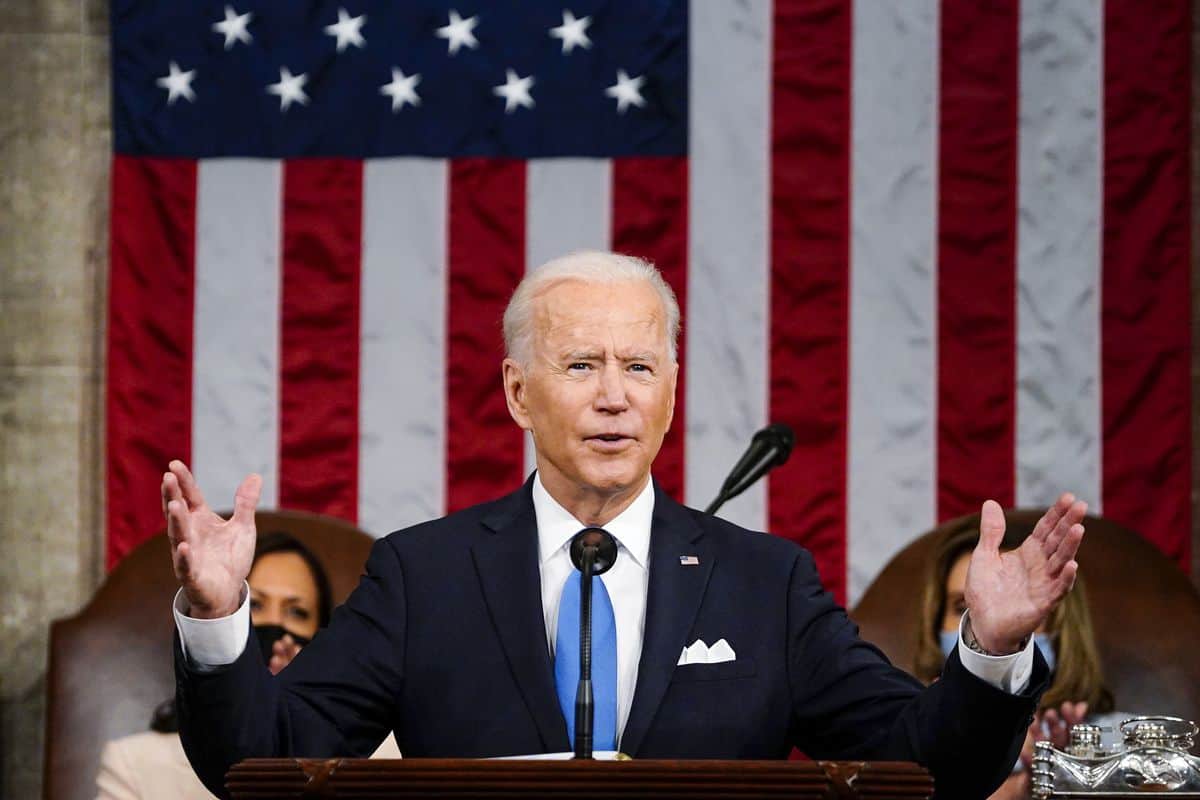Maxwell Ulin is a student at Harvard Law School.
In his first speech to Congress yesterday, President Joe Biden laid out his administration’s sweeping policy agenda, outlined in two major legislative packages delivered to Congress. The latter of the two proposals, dubbed “The American Families Plan” (AFP), was released yesterday in anticipation of the speech. Among other provisions, the plan would provide up to $200 billion in funding over ten years for universal pre-kindergarten for three- and four-year-olds and another $225 billion to support child-care services and subsidies. All child-care providers receiving federal support would be required to pay their employees a minimum of $15 per hour. The AFP also allocates another $225 billion to create the nation’s first national paid sick leave program, guaranteeing up to twelve weeks of partial wages each year for employees who are sick, new parents, familial caregivers, and survivors of sexual assault, stalking, and domestic abuse. Workers would qualify for up to 66% of their ordinary wages, with a cap of $4,000 monthly. Biden’s paid sick leave proposal closely resembles the one proposed in the FAMILY Act, sponsored by Sen. Kirsten Gillibrand (D-NY), with some slight differences.
During his speech, Biden also called on Congress to raise the minimum wage to $15 an hour and pass the Protect the Right to Organize (PRO) Act, the latter of which would constitute the largest overhaul of federal labor law in over half a century. With the PRO Act picking up Senate support in recent weeks, labor activists have zeroed in on the three remaining Senate Democrats who have yet to sign on: Mark Warner (D-VA), Mark Kelly (D-AZ), and Kyrsten Sinema (D-AZ). Already, more than $1 million in radio and TV ads have been booked in Arizona and Virginia to pressure them to support the bill. Yet as Ash notes, even with their support, the PRO Act will likely struggle to overcome the filibuster or pass muster under budget reconciliation, confronting the same fate as has Biden’s proposed minimum wage increased.
Eager to act, the Biden administration already took executive action to raise wages this week. On Tuesday, Biden issued an executive order initiating a rulemaking to require all federal contractors to pay their employees a minimum $15 per hour. The wage floor for federal contractors hasn’t gone up since an Obama executive order in 2014, raising rate to $10.95. The Biden order, effective March 30, 2022, will amount to a 37% increase in the hourly minimum. According to the Economic Policy Institute (EPI), the order will raise wages for some 390,000 federal contractor employees by an average of $3,100 a year. The order also proposes to tie the wage floor to inflation going forward and would eliminate exemptions for tipped workers and outdoor guides.
On Monday, as well, the Department of Labor finally sent the Occupational Safety & Health Administration’s (OSHA) proposed workplace safety standards for COVID-19 over to the Office of Information and Regulatory Affairs (OIRA) for review. The emergency standard, long delayed after an early Biden executive order set the rulemaking deadline for March, will mark the first time since 1983 that OSHA has used its emergency powers to enact an expedited temporary standard. As the Biden presidency approaches the 100-day mark, EPI sums up what else the administration has and has not accomplished for workers thus far.
Even as rulemaking takes place, the nomination process remains ongoing for many Biden administration appointees. Today, Jennifer Abruzzo, Biden’s nominee for the position of General Counsel at the National Labor Relations Board (NLRB), is expected to appear before the Senate Health, Education, Labor, and Pensions (HELP) Committee for her nomination hearing. GOP senators are likely to grill her over Biden’s unprecedented firing of Abruzzo’s in the job predecessor, Peter Robb, with conservative legal groups already lining up to challenge any decisions Abruzzo takes in the post prior to the end of Robb’s term as unlawful. As Bloomberg notes, Abruzzo’s over 20 years of experience as a Board attorney, coupled with the Biden administration’s vocal support for organized labor, could position her to become one of the most transformative general counsels since the position’s establishment.
In addition to Abruzzo, Biden is poised to nominate Brandeis University Professor David Weil to his old Obama-era post as the Department of Labor’s Wage & Hour Administrator. During his last tenure, Weil gained a reputation for aggressively pursuing the issue of employee misclassification under the Fair Labor Standards Act (FLSA), particularly in low-wage industries like trucking and janitorial service. Weil, who gained academic acclaim for his scholarship on the rise of “fissured work,” has been a vocal critic of Uber, Lyft, and other rideshare companies for refusing to reclassify their drivers as employees. Should he be confirmed, Weil would play a crucial role in deciding whether to issue a new, more restrictive legal standard for independent contractors under FLSA, a move in which could greatly affect rideshare and other gig-based companies.
On a related note, yesterday the Ninth Circuit ruled that California truckers are not exempt from the state’s rigid “ABC” test for employee status due to federal preemption. Writing for panel’s majority, Judge Sandra S. Ikuta held that since California’s employee-status test—codified by Assembly Bill 5 in 2018—does not “bind, compel, or freeze into place the prices, routes, or services of motor carriers,” the law is not preempted by the Federal Aviation Administration Authorization Act (FAAAA). The case, Cal. Trucking Ass’n v. Bonta, 9th Cir., No. 20-55106, is expected to affect around 70,000 truckers throughout the state. The decision also adds to a growing circuit split over state employment law and FAAAA preemption; while a recent First Circuit decision conflicts directly with the Bonta court’s conclusion, the Ninth Circuit’s judgement aligns with rulings in both the Third Circuit and the Seventh. Also yesterday, a separate Ninth Circuit panel overturned a decision by the NLRB that deemed a picket by janitorial employees an unlawful secondary boycott. Refusing to address the employees’ First Amendment challenge to the boycott ban itself, the court held that the Board’s finding was unsupported by substantial evidence, which showed that the picket failed the NLRB’s secondary boycott standard.






Daily News & Commentary
Start your day with our roundup of the latest labor developments. See all
July 26
Prop 22 survives; video game workers take action; NLRB challenged.
July 25
Disney union reaches tentative agreement, FAA agrees to improve worker conditions, and Olympic dancers drop strike notice.
July 24
Unions demand end to military aid for Israel; UAW and Teamsters hold out on Harris endorsement; Judge declines to block FTC ban on non-competes
July 23
NLRB drops appeal of a district court case striking down its joint employer rule; red states challenge EEOC’s pregnancy rule; and the WNBA players’ union taps advisors.
July 22
Unions respond to Biden's exit, many back Harris.
July 19
The Bronx Defenders Union announces a tentative collective bargaining agreement; Amazon workers continue a strike in Skokie; Bangladesh students continue protests over government job quotas.